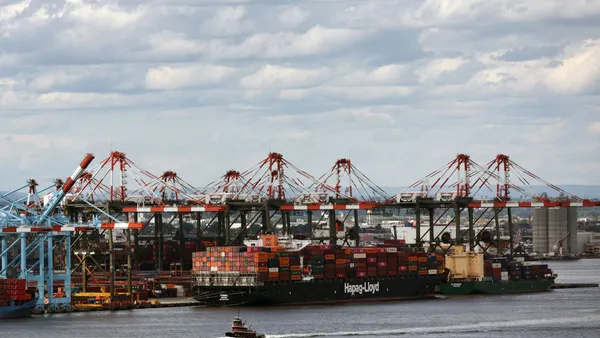Dive Brief:
- The U.S. Federal Maritime Commission (FMC) is reviewing an agreement outlining the ocean shipping industry cooperation required to continue developing TradeLens, the blockchain initiative started by Maersk and IBM. The Commission has until Feb. 6 to reject the agreement or allow it to take effect. CMA CGM, ONE, Maersk, and MSC are among the parties to the agreement.
- The U.S. Shipping Act of 1984 prohibits ocean carriers from working collaboratively within the U.S. without the oversight of the commission. The new TradeLens Agreement outlines how industry collaboration and marketing of TradeLens would go-ahead alongside the law, in the view of the parties signed to it.
- The agreement describes sharing of cargo locations, shipping documents and other data related to the physical movement of goods, but prohibits discussion of rates or terms between carriers and customers. Under the agreement, each new Tradelens member would be filed with the FMC, which is accepting public comments on the agreement until Jan. 13.
Dive Insight:
The terms and extent of the collaboration between competitors required for a successful blockchain platform capable of tracking cargo globally have been at the center of the TradeLens story.
Collaboration and competition butt heads in most supply chain applications of distributed ledger technology because, in order to be useful, entire supply chains must share data among players with which they have likely never shared information before.
As a result, with Maersk at the helm, TradeLens initially had a difficult time recruiting competing carriers to the project. But more quickly started to come on board in February when Seaboard Marine joined. Larger carriers MSC and CMA CGM joined in May, solidifying the platform's future.
TradeLens is intended to speed up the administrative hold-ups that keep ocean shipping from being a precision-timed process for carriers and shippers. In order to do so, all shipping events need to be tracked from end to end and the more players add data, the more complete the tracking.
As the platform recruits participants, the regulatory landscape will become more complicated. CSX recently joined the project — the first railroad to do so. Railroads are similarly barred from competition and will likely require similar approval should more follow suit.
Correction: The report and headline were updated to accurately reflect FMC procedure.














